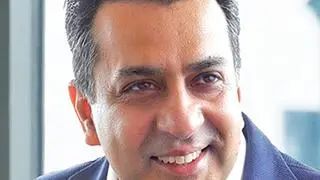Around 30 IBM volunteers from across the globe are now working on community projects in Coimbatore.
The projects include work on distance learning in partnership with Isha Education; on eye care in partnership with Sankara Eye Care and with Siruthuli Trust on environment.
The initiative, which is part of the tech major's Corporate Service Corps (CSC) programme, is a global volunteer programme that places high-potential IBM employees from various countries and business units into strategic emerging markets such as India, Brazil, China, Egypt, Ghana, Malaysia, Nigeria, the Philippines, Romania, South Africa, Tanzania, Turkey, Vietnam, Sri Lanka, Kenya, Indonesia and Morocco to work on core societal challenges, said IBM India's Manager for Corporate Citizenship and Corporate Affairs, Ms Mamtha Sharma.
The goal of the CSC projects is to accelerate and enhance the operations of NGOs and public agencies by providing technology-related assistance.
Without quantifying the fund allocation towards such initiatives, she said that the CSC programme was fully borne by IBM. Each of the projects is estimated at around $250,000, including the travel expense of the IBM staff.
This initiative is now into its fourth year and has covered 50-plus NGOs in India, Ms Sharma said, and pointed out that India would host five CSC teams this year in Chennai, Jaipur and Coimbatore.
The country has hosted up to 12 teams till now and is expected to host 14 the by end of November.
Mr Sverre Sveum Moen from Norway; Mr Benjamin Vera-Tudela, a Peruvian now settled in the US; and Mr Saken Kulkarni, an American Indian, are part of the IBM teams now working on projects in Coimbatore. They told Business Line that ‘expectation management' has been the biggest challenge for the teams since the NGOs want to maximise the support extended by the team within the specified time period of four weeks or so.
“Though the CSC programme is a six-month commitment for each IBMer, the first three months are spent on getting to know the members of the global team, the individual's interest before he or she is placed with an NGO. In fact, the volunteer wouldn't even know which project he or she would be assigned to or which part of the globe he or she would be visiting till a fortnight of being assigned a project,” Ms Sharma explained.
“While we will help by providing a solution that is implementable, we ultimately want the partners to take ownership and move on.”
Mr Sveum Moen, who is engaged in a project with Sankara Eye Care, said that his team would create the framework and design for a centralised knowledge management system for this institution, which is now looking to expand its reach by opening hospitals in other parts of the country.
“The system will be searchable, accessible and retrievable throughout the organisation. We are working on it,” Mr Sveum Moen said.
Sankara Eye Care Institutions has presence in Coimbatore, Krishnankoil, Guntur, Bangalore, Shimoga, Anand, Silvassa, Rishikesh and Ludhiana.
“It is an eye-opening experience for me,” said the Peruvian Mr Vera-Tudela, who is assigned the project with Isha Education.
Capturing the apathy of the rural schools, the children and trainers in such institutions, he said: “I couldn't believe that the parents of these children cannot read or write and getting trainers to train the teachers seems to be a bigger challenge.”
Mr Vera-Tudela's team is working towards creating a knowledge management system that would enable all training materials and programmes to be accessible, retrievable and rebroadcast. “Our design document would enable distance learning teacher training use real-time model. The institution needs such a design because they are planning to open several more Isha Vidhya Schools in rural pockets with virtual class room facilities,” he said.
There are seven Isha Vidhya rural schools in Coimbatore, Erode, Nagercoil, Tuticorin, Villupuram, Salem and Cuddalore, serving 2,745 students.
Mr Kulkarni, a member of the team partnering with Siruthuli Trust and working on the Valankulam Tank rejuvenation project, said there was rampant and indiscriminate dumping of building debris and garbage on the bunds and into the tank. “We will analyse the situation and recommend solutions for harvested hyacinth usage. A lot needs to be done,” he said, referring to the degradation of the environment.








Comments
Comments have to be in English, and in full sentences. They cannot be abusive or personal. Please abide by our community guidelines for posting your comments.
We have migrated to a new commenting platform. If you are already a registered user of TheHindu Businessline and logged in, you may continue to engage with our articles. If you do not have an account please register and login to post comments. Users can access their older comments by logging into their accounts on Vuukle.